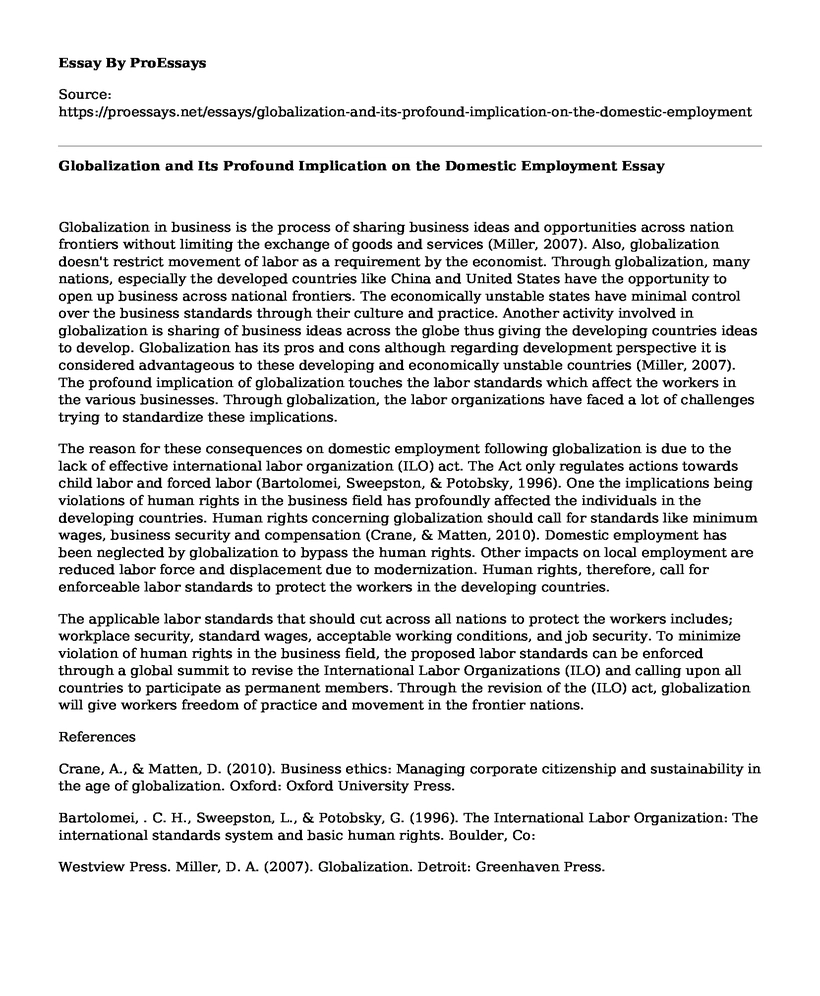Globalization in business is the process of sharing business ideas and opportunities across nation frontiers without limiting the exchange of goods and services (Miller, 2007). Also, globalization doesn't restrict movement of labor as a requirement by the economist. Through globalization, many nations, especially the developed countries like China and United States have the opportunity to open up business across national frontiers. The economically unstable states have minimal control over the business standards through their culture and practice. Another activity involved in globalization is sharing of business ideas across the globe thus giving the developing countries ideas to develop. Globalization has its pros and cons although regarding development perspective it is considered advantageous to these developing and economically unstable countries (Miller, 2007). The profound implication of globalization touches the labor standards which affect the workers in the various businesses. Through globalization, the labor organizations have faced a lot of challenges trying to standardize these implications.
The reason for these consequences on domestic employment following globalization is due to the lack of effective international labor organization (ILO) act. The Act only regulates actions towards child labor and forced labor (Bartolomei, Sweepston, & Potobsky, 1996). One the implications being violations of human rights in the business field has profoundly affected the individuals in the developing countries. Human rights concerning globalization should call for standards like minimum wages, business security and compensation (Crane, & Matten, 2010). Domestic employment has been neglected by globalization to bypass the human rights. Other impacts on local employment are reduced labor force and displacement due to modernization. Human rights, therefore, call for enforceable labor standards to protect the workers in the developing countries.
The applicable labor standards that should cut across all nations to protect the workers includes; workplace security, standard wages, acceptable working conditions, and job security. To minimize violation of human rights in the business field, the proposed labor standards can be enforced through a global summit to revise the International Labor Organizations (ILO) and calling upon all countries to participate as permanent members. Through the revision of the (ILO) act, globalization will give workers freedom of practice and movement in the frontier nations.
References
Crane, A., & Matten, D. (2010). Business ethics: Managing corporate citizenship and sustainability in the age of globalization. Oxford: Oxford University Press.
Bartolomei, . C. H., Sweepston, L., & Potobsky, G. (1996). The International Labor Organization: The international standards system and basic human rights. Boulder, Co:
Westview Press. Miller, D. A. (2007). Globalization. Detroit: Greenhaven Press.
Cite this page
Globalization and Its Profound Implication on the Domestic Employment. (2021, Mar 23). Retrieved from https://proessays.net/essays/globalization-and-its-profound-implication-on-the-domestic-employment
If you are the original author of this essay and no longer wish to have it published on the ProEssays website, please click below to request its removal:
- Critical Essay on An Experiment by Joseph Campos: The Visual Cliff
- Essay Sample on Influence of Climate Change on the Collapse of Classic Maya Society
- Essay Example on the Great Recession: Causes & Effects
- Essay Sample on Social Capital: Enhancing Societal Functioning & Relationships
- Essay Example on Conflict: Causes & Challenges in Interpersonal Relationships
- Free Essay: Understanding and Addressing Racism-Related Stress for Healing and Unity
- The Politics of Race Are Shifting, and Politicians are Struggling to Keep Pace







